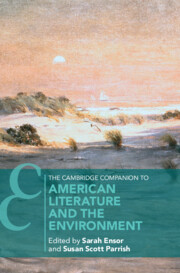Book contents
- The Cambridge Companion to American Literature and the Environment
- The Cambridge Companion to American Literature and the Environment
- Copyright page
- Dedication
- Contents
- Figures
- Contributors
- Acknowledgments
- A Note on the Cover Image
- Introduction
- Part I Environmental Histories
- Part II Environmental Genres and Media
- Part III Environmental Spaces, Environmental Methods
- Chapter 11 Urban Narrative and the Futures of Biodiversity
- Chapter 12 Japanese American Incarceration and the Turn to Earth: Looking for a Man Named Komako in Bad Day at Black Rock
- Chapter 13 Leisure over Labor: Latino Outdoors and the Production of a Latinx Outdoor Recreation Identity
- Chapter 14 Sanctuary: Literature and the Colonial Politics of Protection
- Chapter 15 The Queer Restoration Poetics of Audre Lorde
- Notes
- Index
- Cambridge Companions to …
Chapter 13 - Leisure over Labor: Latino Outdoors and the Production of a Latinx Outdoor Recreation Identity
from Part III - Environmental Spaces, Environmental Methods
Published online by Cambridge University Press: 10 March 2022
- The Cambridge Companion to American Literature and the Environment
- The Cambridge Companion to American Literature and the Environment
- Copyright page
- Dedication
- Contents
- Figures
- Contributors
- Acknowledgments
- A Note on the Cover Image
- Introduction
- Part I Environmental Histories
- Part II Environmental Genres and Media
- Part III Environmental Spaces, Environmental Methods
- Chapter 11 Urban Narrative and the Futures of Biodiversity
- Chapter 12 Japanese American Incarceration and the Turn to Earth: Looking for a Man Named Komako in Bad Day at Black Rock
- Chapter 13 Leisure over Labor: Latino Outdoors and the Production of a Latinx Outdoor Recreation Identity
- Chapter 14 Sanctuary: Literature and the Colonial Politics of Protection
- Chapter 15 The Queer Restoration Poetics of Audre Lorde
- Notes
- Index
- Cambridge Companions to …
Summary
This chapter addresses efforts to increase racial and ethnic diversity on US public lands and in US outdoor recreation through a case study of the organization Latino Outdoors. It argues that Latino Outdoors works to upend the exclusion of Latinx peoples from outdoor recreation and public lands through constructing and disseminating a Latinx Outdoor Recreation Identity. In doing so, Latino Outdoors disrupts a US cultural logic which incorporates the labor of Latinx peoples while denying their substantive citizenship as well as their political and ecological belonging. In contrast to legacies of Latinx outdoor labor, Latino Outdoors embraces Latinx leisure, and specifically Latinx outdoor leisure. Furthermore, the organization emphasizes historical forms of Latinx environmental knowledge, and thus environmental belonging. Latino Outdoors creates new forms of Latinx environmental belonging founded on leisure rather than labor. These forms of environmental belonging operate within Latino Outdoors as a proxy for political belonging and the grounds for political action.
Keywords
- Type
- Chapter
- Information
- Publisher: Cambridge University PressPrint publication year: 2022
- 2
- Cited by

